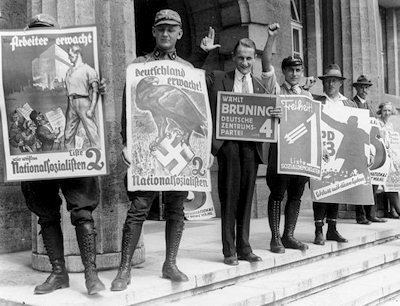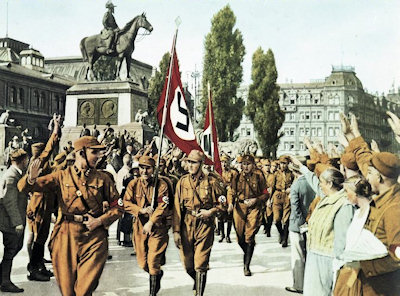
Germans Elect Nazis
Adolf Hitler and the Nazis waged a modern whirlwind campaign in 1930 unlike anything ever seen in Germany. Hitler traveled the country delivering dozens of major speeches, attending meetings, shaking hands, signing autographs, posing for pictures, and even kissing babies.
Joseph Goebbels brilliantly organized thousands of meetings, torchlight parades, plastered posters everywhere and printed millions of special edition Nazi newspapers.
Germany was in the grip of the Great Depression with a population suffering from poverty, misery, and uncertainty, amid increasing political instability.
For Hitler, the master speech maker, the long awaited opportunity to let loose his talents on the German people had arrived. He would find in this downtrodden people, an audience very willing to listen. In his speeches, Hitler offered the Germans what they needed most, encouragement. He gave them heaps of vague promises while avoiding the details. He used simple catchphrases, repeated over and over.
His campaign appearances were carefully staged events. Audiences were always kept waiting, deliberately letting the tension increase, only to be broken by solemn processions of Brownshirts with golden banners, blaring military music, and finally the appearance of Hitler amid shouts of "Heil!" The effect in a closed in hall with theatrical style lighting and decorations of swastikas was overwhelming and very catching.
Hitler began each speech in low, hesitating tones, gradually raising the pitch and volume of his voice then exploding in a climax of frenzied indignation. He combined this with carefully rehearsed hand gestures for maximum effect. He skillfully played on the emotions of the audience bringing the level of excitement higher and higher until the people wound up a wide-eyed, screaming, frenzied mass that surrendered to his will and looked upon him with pseudo-religious adoration.
Hitler offered something to everyone: work to the unemployed; prosperity to failed business people; profits to industry; expansion to the Army; social harmony and an end of class distinctions to idealistic young students; and restoration of German glory to those in despair. He promised to bring order amid chaos; a feeling of unity to all and the chance to belong. He would make Germany strong again; end payment of war reparations to the Allies; tear up the treaty of Versailles; stamp out corruption; keep down Marxism; and deal harshly with the Jews.
He appealed to all classes of Germans. The name of the Nazi Party itself was deliberately all inclusive – the National Socialist German Workers' Party.
All of the Nazis, from Hitler, down to the leader of the smallest city block, worked tirelessly, relentlessly, to pound their message into the minds of the Germans.
On election day September 14, 1930, the Nazis received 6,371,000 votes – over eighteen percent of the total – and were thus entitled to 107 seats in the German Reichstag. It was a stunning victory for Hitler. Overnight, the Nazi Party went from the smallest to the second largest political party in Germany.
It propelled Hitler to solid national and international prestige and aroused the curiosity of the world press. He was besieged with interview requests. Foreign journalists wanted to know – what did he mean – tear up the Treaty of Versailles and end war reparations? – and that Germany wasn't responsible for the First World War?
Gone was the Charlie Chaplin image of Hitler as the laughable fanatic behind the Beer Hall Putsch. The beer hall revolutionary had been replaced by the skilled manipulator of the masses.
On October 13, 1930, dressed in their brown shirts, the elected Nazi deputies marched in unison into the Reichstag and took their seats. When the roll-call was taken, each one shouted, "Present! Heil Hitler!"
They had no intention of cooperating with the democratic government, knowing it was to their advantage to let things get worse in Germany, thus increasing the appeal of Hitler to an ever more miserable people.
Nazi storm troopers dressed in civilian clothes celebrated their electoral victory by smashing the windows of Jewish shops, restaurants and department stores, an indication of things to come.
Now, for the floundering German democracy, the clock was ticking and time was on Hitler's side.
Copyright © 1996 The History Place™ All Rights Reserved
![]()
NEXT SECTION - Success and a Suicide
The Rise of Hitler Index
The History Place Main Page
Terms of use: Private home/school non-commercial, non-Internet re-usage only is allowed of any text, graphics, photos, audio clips, other electronic files or materials from The History Place.


No comments:
Post a Comment
Comments that are courteous, concise and relevant are always welcome, whether or not they agree with the views expressed here or not. Profanity is not necessary. Thank you for reading “Time Enough At Last!”
Ron